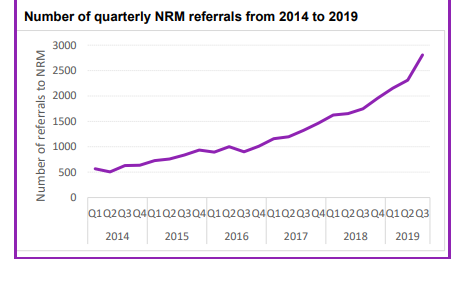Thirty potential modern slavery victims referred to Home Office each day amid surge in cases, figures show
Former anti-slavery commissioner says UK ‘still inadequately resourced’ for dealing with problem

Your support helps us to tell the story
From reproductive rights to climate change to Big Tech, The Independent is on the ground when the story is developing. Whether it's investigating the financials of Elon Musk's pro-Trump PAC or producing our latest documentary, 'The A Word', which shines a light on the American women fighting for reproductive rights, we know how important it is to parse out the facts from the messaging.
At such a critical moment in US history, we need reporters on the ground. Your donation allows us to keep sending journalists to speak to both sides of the story.
The Independent is trusted by Americans across the entire political spectrum. And unlike many other quality news outlets, we choose not to lock Americans out of our reporting and analysis with paywalls. We believe quality journalism should be available to everyone, paid for by those who can afford it.
Your support makes all the difference.Thirty potential modern slavery victims are being referred to the Home Office each day after cases surged more than a fifth in three months, prompting questions over whether enough resource is being put into tackling the issue.
Government data shows 2,808 people feared to have been trafficked were reported to the National Referral Mechanism – Britain’s framework for identifying victims – in the three months to October. This amounts to a 21 per cent increase on the previous quarter and a 61 per cent rise on the same period last year – and marks the biggest increase since 2014.
Campaigners said that while it indicated increased awareness, ministers were failing to address "well-evidenced drivers" of modern slavery and direct adequate resources to tackling the problem.

The potential victims were of 91 different nationalities, but those most commonly referred were from the UK, which accounted for 26 per cent of cases, Albania and Vietnam.
Forty per cent – or 1,175 – potential victims were children, and the most common type of exploitation for both adults and minors was labour-related, the figures showed.
Kevin Hyland, the former anti-slavery commissioner for the UK, told The Independent the system was “still inadequately resourced” for dealing with the problem.
He said: “As I have continuously stated, decision-making should not be a role of the Home Office, this is a serious crime and needs multi-agency professionals such as health, housing and police involved to meet the needs of the victims.
“How can a life-changing decision be made remotely by a person who never meets a victim?”
He added: “In cases of rape specialist health care professionals, sexual offences trained police officers and NGOs are engaged from the outset.
“In cases of modern slavery, the entire process can be delayed or even disconnected at the discretion of a civil servant who may be many miles away.”
Emily Kenway, senior adviser at Focus on Labour Exploitation (Flex), said that while it was “good news” that more people were being supported to escape exploitation, the rise in victims showed the UK was “still failing on preventing exploitation in the first place”.
She added: “Hostile environment policies, lack of regulation and woeful under-funding of labour inspection are all well-evidenced drivers of modern slavery, yet government has refused to address them. Without deep action to tackle these drivers, victimisation will continue to rise.“
The Home Office says it has an ambitious modern slavery strategy in place and that it is implementing significant reforms to the NRM to make substantial improvements to the support system for victims.
Join our commenting forum
Join thought-provoking conversations, follow other Independent readers and see their replies
Comments